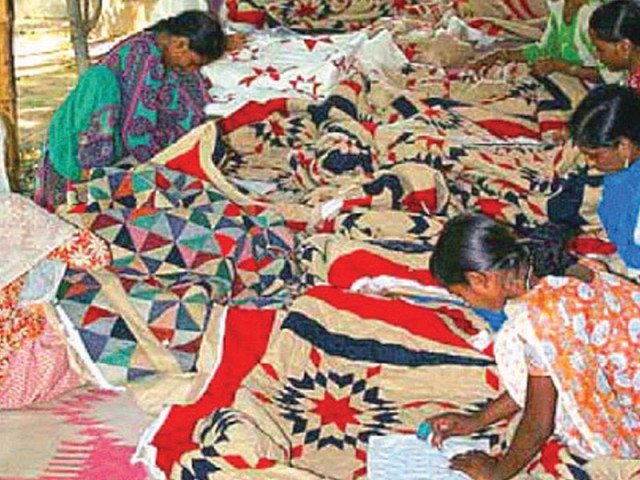Novel approach: Interest-free lending to poor surprises ‘the entire world’
10 years on, NGO Akhuwat has given Rs3.3 billion in microfinance for setting up or expanding businesses.

Akhuwat has shifted to the group lending model for the last one year. In this model, borrowers living in the same locality become each other’s guarantors, thus ensuring a high recovery rate. PHOTO: FILE
Microfinance, as we know it, can possibly be expensive in Pakistan, as interest rates charged by microfinance institutions hover around 30%. While the worldwide consensus tends to be in favour of lending to the poor through for-profit microfinance institutions, a novel microfinance model has worked successfully for over a decade in Pakistan that has baffled microfinance experts all over the world.
Based on interest-free lending to the people living below the proverbial poverty line to help them set up or expand their businesses, the non-governmental organisation, Akhuwat, has already disbursed over Rs3.3 billion to 231,335 families all over Pakistan since 2003.
“We met representatives from African countries in a recent conference in Dubai, who asked us to set up an interest-free microfinance institution in Africa. Poverty is an endless cycle, which gets worse because of interest-based lending,” said Abubakr Siddique, Chief Coordinator of Akhuwat, while speaking to The Express Tribune in an interview.
Akhuwat gave the first loan of Rs10,000 in 2003 to a woman in Lahore. She paid it back in instalments in six months instead of one year. That motivated Dr Amjad Saqib, elder brother of Siddique, to set up a fund under the banner of Akhuwat with the help of his friends and acquaintances, which lends money to the poor to help them become self-reliant.

Today, Akhuwat operates in 105 cities and towns across Pakistan through 153 branches. The number of its active loans is 104,600 while the outstanding loan portfolio is over Rs1.1 billion.
Many of Akhuwat’s 3,500 donors belong to the corporate sector, according to Siddique. But up to 90% of donors are individuals, most of them being part of the salaried class, he adds. The average size of a donation ranges between Rs1,000 and Rs5,000.
“We don’t accept donations from any international body. The concept of Akhuwat is that if the haves of our society help the have-nots, we can all prosper collectively,” he says.
The average loan size of Akhuwat is between Rs12,000 and Rs15,000 while the maximum loan limit is Rs50,000. Notably, the recovery rate for loans of Rs3.3 billion that have been disbursed so far is an astonishing 99.83%.
Siddique attributes the high recovery rate to the trust factor that Akhuwat develops with its borrowers through several means. For example, Akhuwat operates through places of worship – mosques and churches – which results in enhanced community involvement, leading to on-time payment of instalments.
Secondly, Akhuwat has shifted to the group lending model for the last one year. In this model, borrowers living in the same locality become each other’s guarantors, thus ensuring a high recovery rate.
For instance, if six people approach Akhuwat for micro-financing, three of them become borrowers while others become their guarantors. Once the loan is paid back, the guarantors become eligible to be borrowers while the first group of borrowers assumes the role of guarantors.
These borrowers need not necessarily take up loans for a joint business. Neither do they have to be family members or relatives to acquire micro-financing.
“The reason our recovery rate is so high is that we trust our borrowers. The rich may default on a loan. But the poor, who borrow to set up or expand their businesses, don’t ever default, unless there’s some unforeseen event,” he says.
The majority of Akhuwat’s borrowers is between 25 and 30 years of age, according to Siddique. Although the payback time is determined on the basis of the borrower’s business, it is generally between 12 and 18 months. With 81,681 borrowers, the percentage of female entrepreneurs is 35.3%.
“Akhuwat is taught at Harvard, Princeton and Tufts universities in the United States, and in Oxford University in the United Kingdom, as a case study. Two Harvard students come here every year to learn about Akhuwat,” he says, proudly. “Our interest-free lending method and a high recovery rate have surprised the entire world.”
Published in The Express Tribune, January 25th, 2013.
Like Business on Facebook to stay informed and join in the conversation.



















COMMENTS
Comments are moderated and generally will be posted if they are on-topic and not abusive.
For more information, please see our Comments FAQ